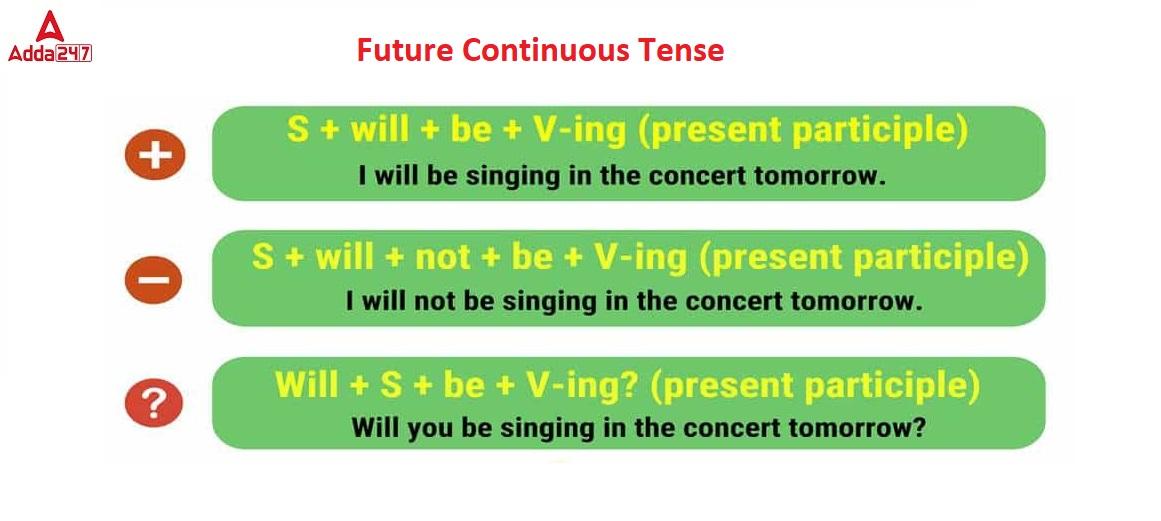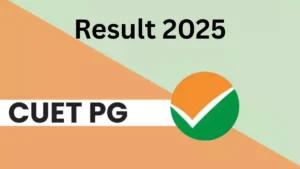Table of Contents
Future Continuous Tense
The future continuous tense is used to describe activities or occurrences that will occur at a certain moment in the future and will be ongoing or in progress. It is created by combining “will be” with the base form of the verb plus “-ing.”
Future Continuous Tense Example –
My exams are tomorrow, so I’ll be studying.
They will be visiting Europe next month.
Next week at this time, she will be preparing dinner.
To put it simply, this type of tense is used to express acts that will occur in the future and will be ongoing or in process at a specific moment. It emphasizes the future duration or continuance of the action.
Future Continuous Tense (Progressive Tense)
The future tense refers to tenses that indicate that something will happen in the future and will last for an expected period of time. Also called Future Progressive. In simple words, the future continuous tense refers to/denotes a verb that occurs in the future and lasts a certain amount of time.
Future Continuous Tense Formula
The Future Continuous Tense formula is given below
| Subject + will +be + base form of the verb + the rest of the sentence |
However, there are other things to be aware of. You should also learn how sentences are constructed using the future tense of verbs when the verbs are positive, negative, interrogative, and negative interrogative.
Future Continuous Tense Structure
Look at the table below to get a better understanding of the structure of the Future tense.
| Positive | Negative | Interrogative | Negative Interrogative |
| Subject + will +be + base form of the verb + the rest of the sentence | Subject + will +not+ be+ present participle (verb+ing) + the rest of the sentence.
(or) Subject + won’t + be+ present participle (verb+ing) + the rest of the sentence? |
Will + subject + be + present participle (verb+ing) + the rest of the sentence? | Will + subject + not+ be+ present participle (verb+ing) + the rest of the sentence?
(or) Won’t + subject + be+ present participle (verb+ing) + the rest of the sentence? |
Examples
|
Examples
|
Examples
|
Examples
(OR)
|
Note:- Won’t is a contraction used for will not
Future Continuous Tense Uses
- The future tense is used to talk about future events that will occur at a specific time in the future. This structure is often used to create a contrast between current events and future events.
For examples:
- This time tomorrow I will be sleeping.
The above sentence shows the differentiation between the present moment and the future event.
2. It can be used to make predictions also.
For examples:
- She will be sleeping this time.
The above sentence predicts what she can do now.
Rules to Remember about Future Continuous Tense
Rules to be used while writing in this type of tense.
- Use ‘will be’ while writing the sentence in this type of tense.
- Add ‘-ing’ in the main action verb.
- Note that while making the sentence in the negative form ‘not’ will come in between will and be. Like ‘will not be’.
Future Continuous Tense Examples
Here are some examples of Future Continuous Tense for the better understanding
- Children will be going to school. (Positive)
- Children will not be going to school. (Negative)
- Will children be going to school? (Interrogative)
- Won’t children be going to school? (Negative interrogative)
- The boys will be playing in the park. (Positive)
- The boys will not be playing in the park. (Negative)
- Will the boys be playing in the park? (Interrogative)
- Won’t the boys be playing in the park? (Negative interrogative)
- The baby will be crying out loud. (Positive)
- The baby will not be crying out loud. (Negative)
- Will the baby be crying out loud? (Interrogative)
- Won’t the baby be crying out loud? (Negative interrogative)
- It will be raining now. (Positive)
- It won’t be raining now. (Negative)
- Will it be raining now? (Interrogative)
- Won’t it be raining now? (Negative interrogative)
- I will be cooking pasta for lunch. (Positive)
- I won’t be cooking pasta for lunch. (Negative)
- Will I be cooking pasta for lunch? (Interrogative)
- Won’t I be cooking pasta for lunch? (Negative interrogative)
- Miss Peters will be teaching in the class. (Positive)
- Miss Peters won’t be teaching in the class. (Negative)
- Will Miss Peters be teaching in the class? (Interrogative)
- Won’t Miss Peters be teaching in the class? (Negative interrogative)
Future Continuous Tense Examples
30 examples of sentences in the future continuous tense:
- I will be studying for my exams tomorrow evening.
- She will be cooking dinner at this time next week.
- They will be traveling to Europe next month.
- We will be working on the project throughout the weekend.
- He will be attending a conference next Thursday.
- The kids will be playing in the park later this afternoon.
- I will be running a marathon next year.
- They will be rehearsing for the play all week.
- She will be taking a yoga class tomorrow morning.
- We will be watching a movie tonight.
- He will be giving a presentation at the conference.
- The team will be practicing for the match tomorrow.
- I will be visiting my grandparents next weekend.
- They will be celebrating their anniversary next month.
- We will be waiting for the bus at this time tomorrow.
- She will be finishing her assignment by tomorrow evening.
- He will be working late tonight.
- The company will be launching a new product next week.
- I will be volunteering at the charity event on Saturday.
- They will be renovating their house next year.
- We will be attending a wedding next month.
- She will be learning to play the piano in the coming weeks.
- He will be taking a break from work next week.
- They will be preparing for the exam all night.
- We will be going on a vacation next summer.
- The construction workers will be building the bridge for the next six months.
- I will be starting a new job next month.
- They will be moving to a new city in the near future.
- She will be practicing her dance routine for the competition.
- We will be hosting a party next Saturday.
Future Continuous Tense in Hindi
भविष्य काल उन काल को संदर्भित करता है जो इंगित करते हैं कि भविष्य में कुछ होगा और समय की अपेक्षित अवधि तक चलेगा। फ्यूचर प्रोग्रेसिव भी कहा जाता है। सरल शब्दों में, फ्यूचर कंटीन्यूअस टेंस एक क्रिया को संदर्भित करता है / जो भविष्य में होता है और एक निश्चित समय तक रहता है।
फ्यूचर कंटीन्यूअस टेंस – फॉर्मूला
विषय + होगा + क्रिया का आधार रूप + शेष वाक्य
हालांकि, इसके बारे में जागरूक होने के लिए अन्य चीजें हैं। आपको यह भी सीखना चाहिए कि जब क्रिया सकारात्मक, नकारात्मक, प्रश्नवाचक और नकारात्मक प्रश्नवाचक होती है, तो क्रियाओं के भविष्य काल का उपयोग करके वाक्यों का निर्माण कैसे किया जाता है।
Future Continuous Tense Examples in Hindi
बेहतर समझ के लिए फ्यूचर कंटीन्यूअस टेंस के कुछ उदाहरण यहां दिए गए हैं
बच्चे स्कूल जा रहे होंगे। (सकारात्मक)
बच्चे स्कूल नहीं जा रहे होंगे। (नकारात्मक)
क्या बच्चे स्कूल जा रहे होंगे? (पूछताछ)
क्या बच्चे स्कूल नहीं जा रहे होंगे? (नकारात्मक पूछताछ)
लड़के पार्क में खेल रहे होंगे। (सकारात्मक)
लड़के पार्क में नहीं खेल रहे होंगे। (नकारात्मक)
क्या लड़के पार्क में खेल रहे होंगे? (पूछताछ)
क्या लड़के पार्क में नहीं खेल रहे होंगे? (नकारात्मक पूछताछ)
बच्चा जोर-जोर से रो रहा होगा। (सकारात्मक)
बच्चा जोर से नहीं रोएगा। (नकारात्मक)
क्या बच्चा जोर-जोर से रो रहा होगा? (पूछताछ)
क्या बच्चा जोर से नहीं रो रहा होगा? (नकारात्मक पूछताछ)
अब बारिश होगी। (सकारात्मक)
अभी बारिश नहीं होगी। (नकारात्मक)
क्या अब बारिश होगी? (पूछताछ)
क्या अब बारिश नहीं होगी? (नकारात्मक पूछताछ)
मैं दोपहर के भोजन के लिए पास्ता बना रही हूँ। (सकारात्मक)
मैं दोपहर के भोजन के लिए पास्ता नहीं बनाऊँगा। (नकारात्मक)
क्या मैं दोपहर के भोजन के लिए पास्ता पका रहा हूँ? (पूछताछ)
क्या मैं दोपहर के भोजन के लिए पास्ता नहीं बना रही हूँ? (नकारात्मक पूछताछ)
मिस पीटर्स कक्षा में पढ़ा रही होंगी। (सकारात्मक)
मिस पीटर्स कक्षा में नहीं पढ़ा रही होंगी। (नकारात्मक)
क्या मिस पीटर्स कक्षा में पढ़ा रही होंगी? (पूछताछ)
क्या मिस पीटर्स कक्षा में नहीं पढ़ा रही होंगी? (नकारात्मक पूछताछ)
Future Continuous Tense Exercises
After looking at all the examples given, you should have a really good idea of the present continuous tense. Here is the exercise given below for a better understanding of the concepts:
Q. Fill in the blanks using the correct form of the verb given in the bracket:
- I __________ a new iPhone.(buy)
- The teacher ______ in a class. (teach)
- He ______ hard during the exam. (study)
- I _______ with my best friend. (talk)
- She ________ a lot of videos. (watch)
- Mom ______ my house this time. (clean)
- They __________ by airplane. (travel)
- He ________ to learn the french language. (try)
- They _______ in the office. (work)
- He __________ a new skill. (learn)
Check your answers
- I will be buying a new iPhone.
- The teacher will be teaching in a class.
- He will be studying hard during the exam.
- I will be talking with my best friend.
- She will be watching a lot of videos.
- Mom will be cleaning my house this time.
- They will be traveling by airplane.
- He will be trying to learn the french language.
- They will be working in the office.
- He will be learning a new skill.



 CUET PG Result 2025 Soon @exams.nta.ac.i...
CUET PG Result 2025 Soon @exams.nta.ac.i...
 NEET Admit Card 2025 Release Date, How t...
NEET Admit Card 2025 Release Date, How t...
 CUET UG 2025 Vs CUET UG 2024, Check Majo...
CUET UG 2025 Vs CUET UG 2024, Check Majo...










